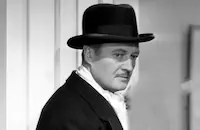Macdonald had made her film debut at Paramount Pictures in Ernst Lubtisch's The Love Parade (1929), co-starring Maurice Chevalier. The film was a big hit, but after a few more films there she left in hopes of producing her own pictures. Her first attempt, The Lottery Bride (1930) didn't do that well, so she signed for three pictures with Fox. After a successful musical, Oh, for a Man! (1930), the studio decided to try her in a non-musical role. For material, they turned to Anthony McGuire's A Good Bad Woman, which had flopped on Broadway in 1919, a play more interesting for its role in shaping baseball history. The play's producer, Harry Frazee, also owned the Boston Red Sox. Its failure, following a particularly bad season for the team, led him to sell some of his top players, most notably Babe Ruth, to the New York Yankees, where Ruth would become baseball's top batter for years.
Although best known for her lilting soprano in films that paired her first with Chevalier and then, most notably, with Nelson Eddy, MacDonald was a skilled comedienne. She wouldn't always get to show those talents in her later MGM films, but Lubitsch certainly brought out the best in her in their films together -- The Love Parade, Monte Carlo (1930), One Hour With You (1932) and The Merry Widow (1934). Here she shines while leading Lowe along, all the while playing up her attraction to him for the benefit of husband Young.
MacDonald is hardly the entire show. Young was an expert at playing dithering husbands like his character here, eventually winning an Oscar® nomination as Cosmo Topper in the supernatural comedy Topper (1937). J.M. Kerrigan, who most often played Irish types, is very funny as Lowe's cavalier sidekick. Whenever MacDonald isn't on screen, the film pretty much belongs to Una Merkle as her flighty friend Tallulah. Merkle sets the plot in motion when she almost drowns near Lowe's yacht, leading to MacDonald's first meeting with the leading man and his invitation to the house party where the wager is made. The character's Southern accent came naturally to the Kentucky-born actress, as did her mile-a-minute dialogue. Merkle had worked at Warner Bros., known at the time for its fast-paced editing and dialogue, in the first film version of The Maltese Falcon (1931) and 42nd Street (1933). Look closely, and you'll catch Cesar Romero in a bit as one of Merkel's dancing partners.
After one more film at Fox -- the lost farce Annabelle's Affairs (1932), which at least gave her one song -- MacDonald took some time off from Hollywood for a European concert tour, then returned to Paramount. Don't Bet on Women was largely forgotten until the Museum of Modern Art set out to restore it with support from Turner Classic Movies and the Celeste Bartos Fund for Film Preservation. The restored print was shown at the 2015 TCM Classic Film Festival.
Director: William K. Howard
Producer: William Fox
Screenplay: Leon Gordon, Lynn Starling
Based on the play A Good Bad Woman and the story "All Women Are Bad" by William Anthony McGuire
Cinematography: Lucien N. Andriot
Cast: Edmund Lowe (Roger Fallon), Jeanette MacDonald (Jeanne Drake), Roland Young (Herbert Drake), J. M. Kerrigan (Chipley Duff), Una Merkel (Tallulah Hope), Helene Millard (Doris Brent), Louise Beavers (Maid), Henry Kolker (Butterfield), Cesar Romero (Bit).




























